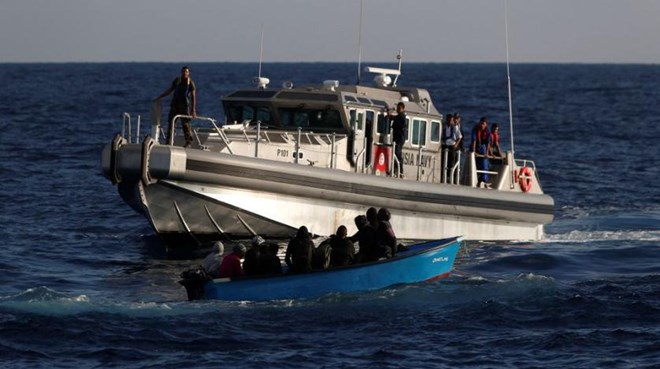
Monday March 27, 2023

Migrants on a wooden boat are rescued by a patrol vessel of the Tunisia Navy, seen from the migrant search and rescue vessel MV Seefuchs of the German NGO Sea-Eye in the search and rescue zone south of the Al Jurf Oilfield in international waters off the coast of Libya, September 30, 2017. REUTERS/Darrin Zammit Lupi
France is ready to help cover Tunisia's remaining financing needs for 2023 and 2024, said France’s ambassador to Tunisia, André Parant, announcing that a package of 250 million euros is currently awaiting disbursement to help the country bridge its budgetary gap.
In an interview with the Tunisian news agency, TAP, the French diplomat said his country was also ready to mobilize international donors to cover the remaining financing needs.
However, he stressed that this support would depend on the “effective” implementation of the reform plan presented to the International Monetary Fund.
Tunisia's economic and budgetary situation may become “extremely complicated in the absence of an agreement with the IMF, according to Parant.
France and Italy are calling for support for Tunisia to prevent an economic collapse and to ease the pressure of migration.
“We have been telling the Tunisian authorities for months that we are at their disposal to cover the residual financing needs for 2023 and 2024,” the French ambassador said, adding that the Tunisian government's budget for 2023 shows a financial gap of around $1.5 to $1.8 billion that needs to be addressed.
The IMF expects to raise $1.9 billion over four years, which means that the first tranche to be disbursed would amount to around $500 million, Parant said.
Observers believe that Tunisia has adopted a strategy implemented by a number of countries to deal with the waves of illegal immigration.
Currently, Tunis is negotiating with the Italian side, behind it is Europe, to obtain financial support in return for monitoring its coasts and limiting the flow of migrants. Tunisian authorities expect this strategy to succeed, relying on its triumph in other countries such as Türkiye.
Meanwhile, the interior ministers of France, Germany and Italy, in addition to the European Commissioner for Home Affairs, Ylva Johansson, plan to visit Tunisia at the end of next April to discuss the issue of irregular migration.
With regard to this issue, the Italian side stressed that “the main problem relies with Tunisia.” Rome says the ministers in Tunis should first discuss the issue of stopping the flow of migrants.
The European delegation will present an offer of assistance and cooperation, conditioned on Tunisia’s stopping the waves of migrants.